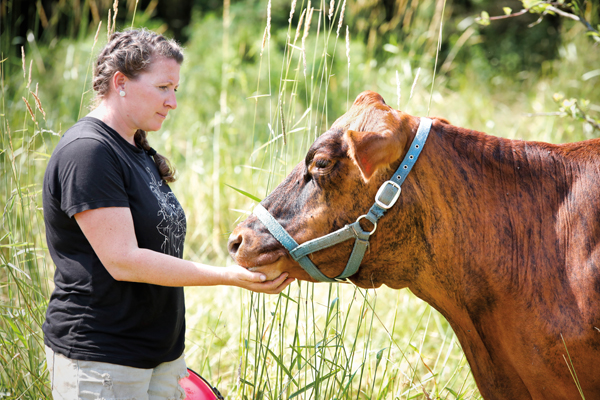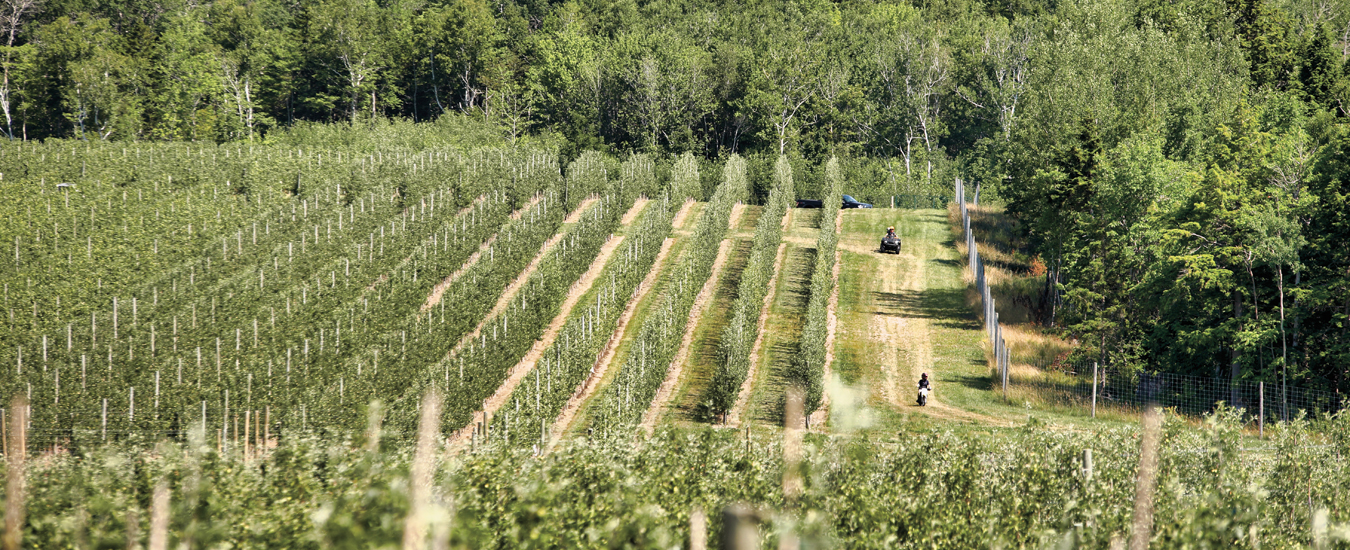No one seems to know where the popular meme and expression, “If you ate today, thank a farmer” came from. But many people take it to heart. Often the meme shows a tranquil photograph, perhaps of a farmer in a field, or a tractor plowing, or a basket of fresh produce.
Those snapshots are part of farm life but it’s not all pastoral beauty, warm greetings at farmers markets, and harvest celebrations. Farming is dirty, tough work, often in freezing or swelteringly temperatures. It entails struggles with crop insurance and livestock losses, economic uncertainties from tariffs and trade barriers, spiking expenses, and the population’s need for inexpensive food. These stresses, if untreated, can lead to anxiety, depression, burnout, and suicide.
Amy Hill understands the stressors. She and husband David operate Snowy River Farms in Cooks Brook, not far from Shubenacadie, N.S. However, David works off-farm now with his contracting business because COVID deeply affected their marketing plan, supplying foods to restaurants, stores, and markets. Amy works the farm with two part-time employees but can’t afford to expand the operation. She’s open about the challenges of farming and the need to champion mental health to other farmers. “I do not want to stop farming,” she says. “I want there to be more farmers growing more food, but it’s not right for farmers to be doing this at a loss, or such high mental, physical and financial stress.”
A Survey of Farmer Mental Health in Canada by Andria Jones from the University of Guelph in 2021 found that one in four Canadian farmers experienced thoughts of suicide within the last 24 months. Suicide ideation is two times higher in farmers than in the general population. And 76 per cent of Canadian farmers report moderate to high stress.
A recent report by Nova Scotia’s Ecology Action Centre, Growing at Home, reports that on average, Nova Scotian farms have been running a deficit, while farm numbers and farmland are decreasing. The province has as low as four per cent self-sufficiency with some crops, meaning farmers aren’t growing anywhere near enough to feed the province. Statistics are similar throughout Atlantic Canada. The average age of farmers in the province is 58 and and only a year younger Canadawide.
The challenges
Merle Massie has farmed all her life. Born and raised on a farm, and still farming today in Saskatchewan, she is executive director of The Do More Agriculture Foundation, a national charity dedicated to mental health in agriculture. Her father had bipolar disorder, and one of her brothers also was diagnosed as bipolar, ultimately taking his own life.
“People don’t want to talk about their mental health, and yet, if a physical injury or sickness happens, a farmer seeks a doctor,” she says. “But often, in the case of a mental health issue, the farmer is afraid of what their family members or neighbours or even their doctor might say, and they’re too afraid to reach out.” Then they may seek relief in self-medicating, which can lead to other problems from addiction to spousal violence.
“When someone is unwell, it affects things all across the farm,” Massie says. “Talking about mental health or unwellness is the first step in breaking the stigma around mental wellness. Often, we don’t even know what we don’t know.”
Access to care and help in rural areas across the country is “abysmal” in Merle’s description. Even if you have a medical professional who understands the complexities of farming, that professional may be several hours away, and a producer doesn’t always have time to go to the doctor. Some suggest telehealth services but rural areas often lack high-speed internet.
Farming is stressful. There’s the time factor, when getting away to a social gathering, agricultural conventions, or even a doctor’s appointment can be hard. Many things are simply out of farmers’ control, including tariffs and trade barriers, costs of everything from seed to a replacement part for the combine, to veterinary medicines. Merle says, “We have no control over the prices we’re charged, and not much over what we receive for our products.”
Do More Ag helps farmers connect to the supports they need, raising awareness at the community level, changing the conversation around mental health and cultivating a culture of wellbeing. Merle says, “Our strength is in being bold and in shining a light and changing the attitude and the stigma.”

Bringing people together
In New Brunswick, Victoria Hutt is the mental health and farm safety coordinator with Agriculture NB, a partnership of several agricultural organizations. She looks after Farm Talk Care, which provides resources and increases awareness for farmers’ mental health. Its Peer Support Network aims to create “a network where people can connect with each other, but we’re also providing training, so they feel confident in helping each other.”
The organization also has a farmer wellness program with free counselling. However, Victoria speaks of a recent report released by the Canadian Mental Health Association, referring to how there aren’t enough mental health professionals in the province, let alone those with some agriculturally informed training.
Farm Safety Nova Scotia has an initiative called We Talk We Grow to raise awareness and take action to protect the mental health of farmers. Its outreach projects include farm ambassadors and farm champions, who help support the farming community and educate others to help end the stigmas surrounding mental health. Many of the ambassadors come from multigenerational farms and have witnessed or experienced challenges, making them keen to encourage others to reach out to help.
In Newfoundland and Labrador, small numbers of farmers and a large geographical region make it harder to get together for social or educational events. Kylie Stokes is executive director of AgriCare NL, the provincial mental health and farm safety program delivered by the Newfoundland and Labrador Federation of Agriculture and the Sustainable Canadian Agricultural Partnership.
“The size of the population here is a blessing and a curse,” she says. “We have so few farmers, our voice is not very loud in the room in terms of federal programming and services and funding. And our farmers are spread out in every little tickle, nook, and cranny, so it’s difficult to connect them.”
“Farmers are tough. Farming is a tough business. But you don’t have to tough it out alone.” That’s the message that Bloyce Thompson, a P.E.I. farmer and the provincial minister of agriculture, is spreading through the island’s Farmers Talk website. Thompson also knows the toll farming can take on its people, as he lost a friend to suicide. Farmers Talk provides a health line plus resources for supporting farmers with issues, as well as for teaching others how to support their farming friends and relatives.
Farmers helping farmers
Nova Scotia’s We Talk We Grow program works to end the stigma around mental health and wellness, with farmers who advocate for other farmers speaking out about their issues and those affecting their friends and neighbours. Janice Lutz farms fruit with her husband Larry just outside Berwick and was active with Farm Safety Nova Scotia on its board before the organization began working with the Federation of Agriculture on promoting mental health. “I lived the changes of my generation, and see the challenges of the next generation,” she says, “so it was a natural fit to get involved.” She and Larry have two sons and a son-in-law working on the farm and know first-hand the challenges of passing on the farm to the next generation.
David Meister and Christina Caldwell operate the Bar M Ranch, a small-scale diverse farm in New Ross, N.S. They produce Christmas trees and wreaths, hay, cattle, and vegetables, plus host on-farm events like staycations and workshops. Both also work full-time off farm but telecommute for the most part. David volunteers as an agricultural ambassador with We Talk We Grow. Having dealt with mental health issues as a farmer, he’s able to talk to fellow farmers who might be going through similar challenges. “Men in particular often act like they have the answers and suppress their feelings,” he says. “There are days when we don’t know what we’re doing and don’t know what comes next, but feel like we’re supposed to.”
Patricia Bishop is part of the nine generations that have run Noggins Corner Farm in Greenwich, N.S. She and husband Josh Oulton also run Taproot Farm in neighbouring Port Williams. Patricia was asked to participate in We Talk We Grow as she had already “been sharing some of the emotional and mental struggles experienced on the farm, as part of my own personal journey,” she says. “That awareness of the struggle and the willingness to speak about it and not be ashamed, or have guilt, or be really private, is what We Talk We Grow is looking for in terms of opening up the conversation about mental health in agriculture.”
Joining the conversation
You may be uncertain about how to help farmers.
David Meister says, “We’re trying to remove bias on what ‘traditional’ agriculture looks like to non-farmers so they can look at farming in a different way. Talking to farmers, at markets or on-farm sales or other events, is a great way to understand what we do.” Knowing that customers have a little understanding of and appreciation for their hard work is a help.
Choosing locally produced food is a huge help to farmers. They need to make a living, we need to eat good food, and we need more farmers across the region.
Farmers by province
- Newfoundland and Labrador ... 344
- Nova Scotia ... 2,741
- New Brunswick ... 1,851
- Prince Edward Island ... 1,195
Source: Canadian Census of Agriculture, 2021
Understanding farm life
There is a growing need for professionals who deal with producers to be agriculturally informed. A medical doctor might not understand the nuances of farming and that it can be exceedingly difficult for a farmer to just “take a day off,” especially during planting, harvesting, or livestock-birthing. Kylie Stokes got in touch with Do More Agriculture when she first took on her role at AgriCare NL, and connected with the Canadian Centre for Agricultural Wellbeing, which offered training for health professionals lacking an agricultural background. “They want to avoid having people calling the farm help lines and getting advice that is not congruent with the life of a farmer.” Even learning to ask the right questions is a huge support.
Provincial mental health helplines
- New Brunswick: 1-866-355-5550
- Newfoundland and Labrador: 811 or 709-752-3916
- Nova Scotia: 1-833-754-3692
- Prince Edward Island: 1-833-553-6983
Provincial agriculture health resources
- New Brunswick: Farm Talk Care
- Newfoundland and Labrador: AgriCare NL
- Nova Scotia: We Talk. We Grow
- P.E.I.: FarmersTalk.ca, 1-800-736-8006
Get help
If you’re in immediate crisis, call 911.
There are also support lines, some dedicated specifically to farmers, across the region.
Access free, confidential mental health and crisis support for the agriculture community anywhere in Canada by calling the National Farmer Crisis line at 1-866-FARMS01.
- AgTalk is an online, safe and anonymous space, with 24/7 clinical moderation, where farmers can register and talk with peers who understand the life on a farm.
- Gerry Friesen, speaker, coach, and author of The Recovering Farmer is an advocate for farmers’ mental health.
- Suicide Crisis Helpline: call or text 9-8-8
- Canadian Association for Suicide Prevention.
In their own words
More farmers share their experiences in this recent Saltscapes story.

